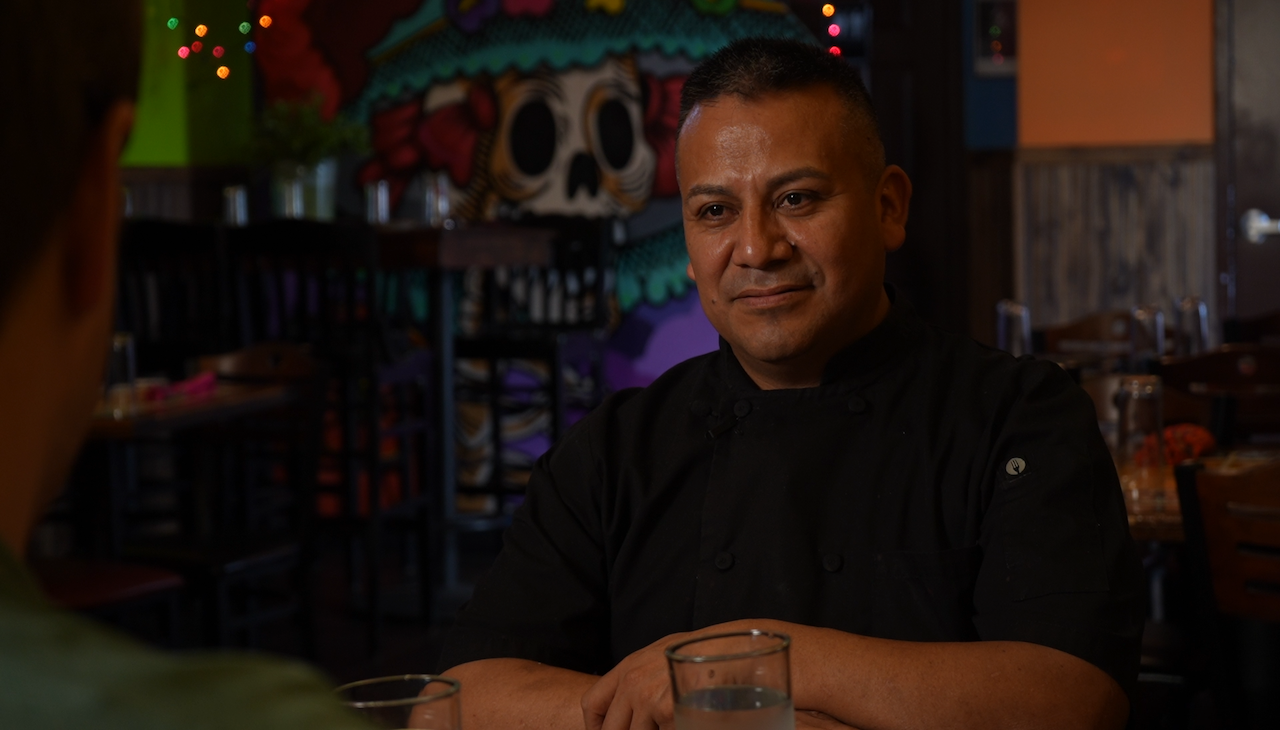
Chef Dionicio Jimenez's Cantina for Change in Kensington
Chef Dionicio Jimenez is a finalist for Best Chef Mid-Atlantic, and it’s a testament to what he’s built for the Kensington community.
A little more than two years ago, the Somerset El stop in Kensington and its surrounding neighborhood became the face of the negative effects of the COVID-19 pandemic, as SEPTA closed the station down to repair its two elevators that were damaged by discarded needles, trash and urine.
For residents, the closure was yet another example of how city leadership long ignored and isolated them — forcing them to travel to Allegheny or Huntington to catch a train to work or elsewhere and with very little notice.
It’s a narrative that’s told far too often in the neighborhood that’s also become ground zero for the U.S.’s battle against opioid addiction, but it’s not the only one that exists there.
A bright spot at Somerset
Two years on from the temporary closure and the problems visibly remain, but now there’s also a bright spot for all who get off at Somerset.
What used to be the dull, matte gray wood paneling of a bar long closed down on the corner is now bright yellow with a blue trim. To the left of the entrance around the corner is now also a colorful piece of art on brick with a woman donning a colorful Day of the Dead mask as its centerpiece, offering a hint of what to expect behind the coke-bottle glass windows that remain from the building’s previous iteration.
Hanging high above the entrance is the new name for this haven — Cantina La Martina
It’s the creation and first restaurant from Mexican Chef Dionicio Jimenez, now a 2023 James Beard Finalist for Best Chef Mid-Atlantic. The recognition is not only for the authentic yet creative twists he puts on traditional Mexican dishes from his childhood and elsewhere, but also what it brings to the surrounding community both culinarily and culturally.
“Nobody talks about the families, only the drugs and crime in Kensington,” he said.
They are who Jimenez’s first restaurant is for, and it’s one that is 24 years in the making.
Learning to cook in secret
Like a majority of South Philadelphia’s Mexican community, Jimenez is a native of San Mateo Ozolco, in Puebla, Mexico. There, and from an early age, he can remember food always playing an integral part of life.
“Every day we passed together with food was good,” he said.
Whether it was breakfast, lunch, dinner or a party, food was what the family gathered around to spend their time.
“It’s a reconciliation,” said Jimenez of food’s power to bring people together.
It was his grandmother that led the kitchen at big gatherings, but beyond her, his mother and aunts were the head chefs of the family kitchen, and who a young Dionicio would get his first culinary lessons from.
{"preview_thumbnail":"/sites/default/files/styles/video_embed_wysiwyg_preview/public/video_thumbnails/UlowdGMjXRk.jpg?itok=UwRWlRkB","video_url":"https://www.youtube.com/watch?v=UlowdGMjXRk","settings":{"responsive":1,"width":"854","height":"480","autoplay":1},"settings_summary":["Embedded Video (Responsive, autoplaying)."]}
He’d watch as they prepared michmole or mole poblano for celebrations like Easter and nopales, salsa, fresh tortillas or beans on any regular day. Sometimes Jimenez would also help out by fetching ingredients from the garden or in any other way he could in the kitchen without facing scorn. At the time, food preparation was still very much only a woman’s role in the household.
Still, Jimenez found ways to pick up best practices from his mom and aunts.
“Everytime I learned, it was hidden,” he told AL DÍA. “It was sneaky.”
But those hidden lessons would eventually translate as he became more serious in the culinary world — both in Mexico and the U.S. In his own words, Jimenez learned the “respect that one gives food” from his family, but also the other families he would join in kitchens in Mexico and Philadelphia.
“It’s like a ritual,” said Jimenez of preparing a dish. “It’s not just putting everything together and cooking, but respecting each individual part of a dish.”
His best example of this from early in life came from watching his mother and aunts prepare mole. Their days-long process involved everything from picking the chiles to milling them, roasting them and then finally incorporating them into the dish on the third or fourth day.
Chef to dishwasher and back again
Work for Jimenez started as early as 10 in a number of odd jobs on construction sites and the like, but it was the restaurant work that stuck. At 14, he started as a dishwasher and would rise through the ranks — from busboy to executive chef over the years within his home country.
Always a learner, Jimenez called the journey “a good experience because I began to learn different things and meet different people.”
It was a journey he’d have to repeat upon coming to Philadelphia in 1998. When arriving, aside from the cold weather and language barrier — “In ‘98, it was hard to find anyone who spoke Spanish” — Jimenez was also a dishwasher again at ChinChin, a restaurant in Center City, and also worked at Vetri Cucina at night.
The new reality initially left a bad taste in Jimenez’s mouth about Philly given his prior kitchen experience, but he once again turned into a sponge to learn as much as he could and rose through the ranks again.
“When I first came, I didn’t see it. But now it’s worthwhile,” said Jimenez.
His new jobs also put him in contact with some of Philly’s best to learn from, including Philippe Chin, Marc Vetri, Jeff Benjamin, Michael Solomonov and eventually, Stephen Starr. Beyond the leaders, Jimenez said he would also learn from all those he worked alongside in the kitchen.
“They were my mentors and everyone who’s crossed my path has taught me something different from their own experiences,” he said.
So once again, Jimenez rose from dishwasher to prep cook, to line cook, to station lead, to head chef — first at Xochitl in 2007 — and then executive chef — at Starr’s El Vez in 2015.
RELATED CONTENT
A pandemic prayer answered
But along the way, there was always a dream to have a spot to call his own.
“Every chef wants their own restaurant,” said Jimenez.
His dream had always moved before Cantina La Martina.
At Xochitl, it was a crash course on learning how to run a kitchen effectively and El Vez was similar but still extremely busy.
During the pandemic, Jimenez said he thought he’d have to let his dream die, but longtime friend Edgar Ramírez at Philatinos Radio put him in contact with a lender that helped secure a loan for the restaurant’s current location.
The change Kensington deserves
“I know I want to achieve my dream but…” was Jimenez’s first thought when seeing where in Kensington his new restaurant would be located during a Summer tour — in the neighborhood’s heart under the El at Somerset.
Jimenez can also remember seeing the tents on both sides of the street where people lived and the overall human suffering that played out on a daily basis.
His friends were also quick to try and dissuade him from opening under the El.
“Don’t do it. Don’t take this location. It’s ugly,” Jimenez remembers their words.
It almost worked, until one day Jimenez came early to the location in the Fall and saw the amount of youth from the surrounding neighborhood that ride the train to school everyday and it changed his whole perspective.
“We always focus on the negative when it comes to Kensington,” Jimenez said. “Yes, there’s a bad reputation of drugs and crime in Kensington, but apart from that there’s families, there’s children, there’s innocent people that live in Kensington. And nobody sees this.”
Cantina La Martina officially opened its doors in February 2022 and was named after the song “La Martina” by ‘El Charro de México’ Antonio Aguilar and a film of the same name. Both have followed Jimenez throughout most of his life.
In a little more than a year, not only has Cantina La Martina become a favorite for those in the surrounding neighborhood, but also the entire city. Every day, more and more curious diners make their way to the restaurant via the El or other modes of transports
That’s only poised to expand more following Jimenez’s 2023 recognition by the James Beard Foundation, where he’s nominated for Best Chef Mid-Atlantic at its James Beard Awards, which recognize the best chefs in the U.S every year.
Fellow Mexican Cristina Martinez of South Philly Barbacoa was recognized with the award just last year and it catapulted her to national and global fame. Should Jimenez win, not only will Cantina see the benefits, but also its entire surrounding neighborhood, which is in dire need of some good attention for once.
That’s already started with articles like this and many more that are sure to come, but Jimenez’s hope is that the attention brings more than just press coverage.
“With the voice of food, with the voice of Cantina, things will begin to change,” he said.











LEAVE A COMMENT: